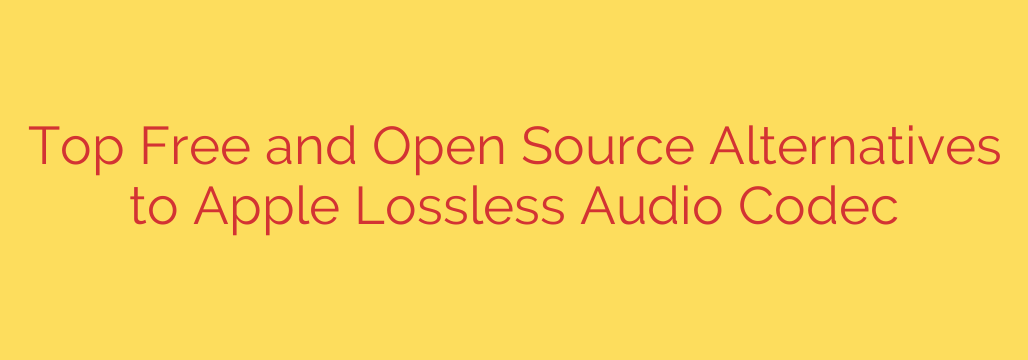
For discerning listeners who demand the highest possible audio fidelity, lossless audio formats are essential. Unlike lossy formats such as MP3 or standard AAC, which discard some audio information to reduce file size, lossless formats preserve every single bit of the original audio data. This means you get perfect sound quality, identical to the source material.
Apple Lossless Audio Codec, or ALAC, is a popular lossless format, especially among users within the Apple ecosystem. However, because it originated as a proprietary format (though it is now open-source), its compatibility can sometimes be limited outside of Apple devices and software. This leads many audiophiles and casual listeners alike to seek high-quality, open-source alternatives that offer broader support and flexibility without sacrificing sound quality.
Fortunately, excellent options are available that provide the same lossless fidelity as ALAC, are widely supported, and are completely free to use.
The most prominent and widely recommended open-source alternative is FLAC (Free Lossless Audio Codec). FLAC is considered the industry standard for lossless audio outside of proprietary ecosystems. Its key advantages include:
- Perfect Fidelity: Just like ALAC, FLAC compresses audio without losing any information. When you decode a FLAC file, the audio stream is bit-for-bit identical to the original source.
- Excellent Compression: While still larger than lossy files, FLAC typically achieves compression ratios of 30-50% compared to the original uncompressed WAV or AIFF files.
- Wide Compatibility: FLAC is supported by a vast range of software players, hardware devices (including many portable music players and streamers), and operating systems. This makes it incredibly versatile for building a digital music library that isn’t tied to a single platform.
- Open Source and Royalty-Free: Being an open-source project, FLAC can be implemented by anyone without needing to pay licensing fees, which has contributed significantly to its widespread adoption.
- Metadata Support: FLAC files support comprehensive metadata tagging, allowing you to organize your music collection with album art, artist information, track numbers, and more.
While FLAC is the dominant player, other less common lossless open-source codecs exist, though they may have more limited software or hardware support. For the vast majority of users seeking an alternative to ALAC, FLAC is the clear choice due to its performance, compatibility, and community support.
Choosing a lossless format like FLAC ensures your digital music collection is future-proofed with the highest possible audio quality. Converting from ALAC to FLAC (or vice versa, using appropriate software) is a common practice, and both formats are excellent ways to preserve your audio exactly as it was recorded. If you’re looking for a reliable, high-performance, and universally compatible lossless audio format, FLAC stands out as the premier open-source alternative to ALAC.
Source: https://www.linuxlinks.com/best-free-open-source-alternatives-apple-lossless-audio-codec/








